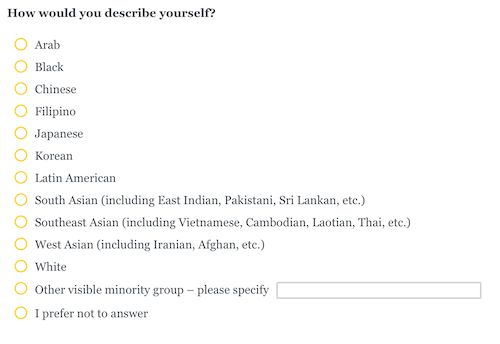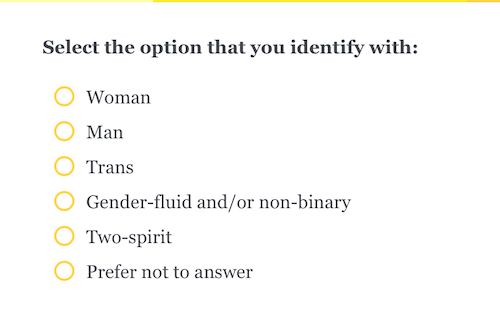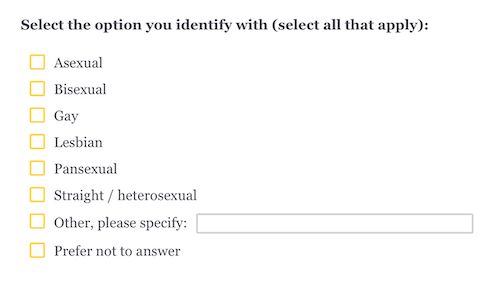Men need not apply
-
https://uwaterloo.ca/research/sites/ca.research/files/uploads/files/crct2-aa-ad.pdf
The Faculty of Environment at the University of Waterloo is seeking an exceptional scholar and researcher to fill a Natural Science and Engineering Research Council (NSERC) Tier 2 Canada Research Chair and tenure track position at the rank of Assistant Professor with an anticipated start date of 1 July 2022. In the case of an exceptional candidate, an appointment at the rank of Associate Professor will be considered. This call is open only to qualified individuals who self-identify as women, transgender, non-binary, or two-spirit.
All applicants to this CRC opportunity are required to self-identify using the self-identification applicant survey at https://uwaterloo.ca1.qualtrics.com/jfe/form/SV_08RcdJzz6YAh4TX. Because this is a special opportunity for a specific member of the four designated groups, applicant self-identification information will be used for the purposes of screening and consideration. Please note that this information will be securely accessed only by members of a central selection committee and, for nominees selected, for the fulfillment of CRC program purposes(s) detailed at: http://www.chairs-chaires.gc.ca/program-programme/equity-equite/index-eng.aspx.
-
@Jolly said in Men need not apply:
What the heck is "two-spirit"?
Read and learn, padawan.
https://lgbtqhealth.ca/community/two-spirit.php
“Two-spirit” refers to a person who identifies as having both a masculine and a feminine spirit, and is used by some Indigenous people to describe their sexual, gender and/or spiritual identity. As an umbrella term it may encompass same-sex attraction and a wide variety of gender variance, including people who might be described in Western culture as gay, lesbian, bisexual, transsexual, transgender, gender queer, cross-dressers or who have multiple gender identities. Two-spirit can also include relationships that could be considered poly. The creation of the term “two-spirit” is attributed to Elder Myra Laramee, who proposed its use during the Third Annual Inter-tribal Native American, First Nations, Gay and Lesbian American Conference, held in Winnipeg in 1990. The term is a translation of the Anishinaabemowin term niizh manidoowag, two spirits.
Two-spirit people may also use terms from their Indigenous language to describe same-sex attraction or gender variance, such as winkt (Lakota) or nàdleehé (Dinéh). Some Indigenous languages do not have terms to describe sexual identities such as gay, lesbian, or bisexual. Many Indigenous languages are verb-focussed, and describe what people do rather than how they identify. For more information, please refer to the Canadian Encyclopedia.
In 2018, our team chose to change our name to Re:searching for LGBTQ2S+ health, in order to make two-spirit people a more visible part of our research. We hope to be able to work in partnership with Indigenous communities to use research as a tool to make visible and address the impacts of colonization on Indigenous LGBTQ2S+ people. -
@Jolly said in Men need not apply:
What the heck is "two-spirit"?
Read and learn, padawan.
https://lgbtqhealth.ca/community/two-spirit.php
“Two-spirit” refers to a person who identifies as having both a masculine and a feminine spirit, and is used by some Indigenous people to describe their sexual, gender and/or spiritual identity. As an umbrella term it may encompass same-sex attraction and a wide variety of gender variance, including people who might be described in Western culture as gay, lesbian, bisexual, transsexual, transgender, gender queer, cross-dressers or who have multiple gender identities. Two-spirit can also include relationships that could be considered poly. The creation of the term “two-spirit” is attributed to Elder Myra Laramee, who proposed its use during the Third Annual Inter-tribal Native American, First Nations, Gay and Lesbian American Conference, held in Winnipeg in 1990. The term is a translation of the Anishinaabemowin term niizh manidoowag, two spirits.
Two-spirit people may also use terms from their Indigenous language to describe same-sex attraction or gender variance, such as winkt (Lakota) or nàdleehé (Dinéh). Some Indigenous languages do not have terms to describe sexual identities such as gay, lesbian, or bisexual. Many Indigenous languages are verb-focussed, and describe what people do rather than how they identify. For more information, please refer to the Canadian Encyclopedia.
In 2018, our team chose to change our name to Re:searching for LGBTQ2S+ health, in order to make two-spirit people a more visible part of our research. We hope to be able to work in partnership with Indigenous communities to use research as a tool to make visible and address the impacts of colonization on Indigenous LGBTQ2S+ people.@George-K said in Men need not apply:
@Jolly said in Men need not apply:
What the heck is "two-spirit"?
Read and learn, padawan.
https://lgbtqhealth.ca/community/two-spirit.php
“Two-spirit” refers to a person who identifies as having both a masculine and a feminine spirit, and is used by some Indigenous people to describe their sexual, gender and/or spiritual identity. As an umbrella term it may encompass same-sex attraction and a wide variety of gender variance, including people who might be described in Western culture as gay, lesbian, bisexual, transsexual, transgender, gender queer, cross-dressers or who have multiple gender identities. Two-spirit can also include relationships that could be considered poly. The creation of the term “two-spirit” is attributed to Elder Myra Laramee, who proposed its use during the Third Annual Inter-tribal Native American, First Nations, Gay and Lesbian American Conference, held in Winnipeg in 1990. The term is a translation of the Anishinaabemowin term niizh manidoowag, two spirits.
Two-spirit people may also use terms from their Indigenous language to describe same-sex attraction or gender variance, such as winkt (Lakota) or nàdleehé (Dinéh). Some Indigenous languages do not have terms to describe sexual identities such as gay, lesbian, or bisexual. Many Indigenous languages are verb-focussed, and describe what people do rather than how they identify. For more information, please refer to the Canadian Encyclopedia.
In 2018, our team chose to change our name to Re:searching for LGBTQ2S+ health, in order to make two-spirit people a more visible part of our research. We hope to be able to work in partnership with Indigenous communities to use research as a tool to make visible and address the impacts of colonization on Indigenous LGBTQ2S+ people.Heads it’s hairpie, tail’s it’s balls across the nose…


